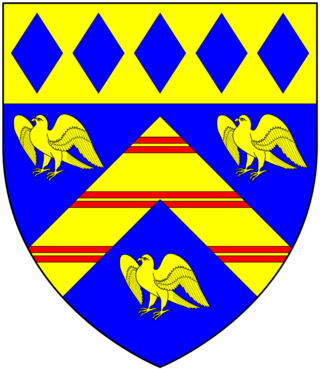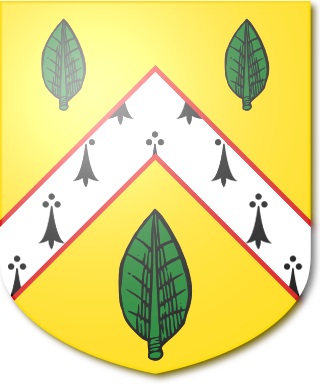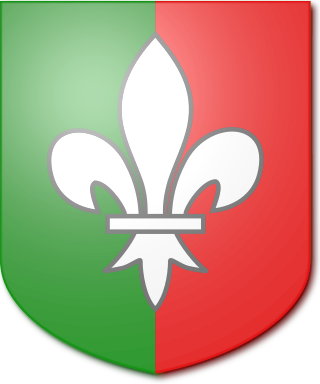
Baron Roborough, of Maristow in the County of Devon, is a title in the Peerage of the United Kingdom. It was created on 24 January 1938 for Sir Henry Lopes, 4th Baronet. He had earlier represented Grantham, Lincolnshire, in Parliament as a Conservative. The Baronetcy, of Maristow House in the County of Devon, had been created in the Baronetage of the United Kingdom on 1 November 1805 for Manasseh Masseh Lopes, a member of a wealthy family of Portuguese Jewish origin, with special remainder to his nephew Ralph Franco, son of his sister Maria. Manasseh Masseh Lopes converted to Christianity in 1802, and later represented Evesham, in Worcestershire, Barnstaple in Devon, and Westbury in Somerset, in Parliament. However, in 1819 he was twice convicted of bribing the voters in both Barnstaple and Grampound in order to be elected to Parliament, and was sentenced to imprisonment and heavy fines. He was also unseated by the House of Commons, but after his release from prison he nonetheless got elected for Westbury, a pocket borough which he controlled to a great extent.

The Strachey baronetcy, of Sutton Court in the County of Somerset, England, is a title in the Baronetage of the United Kingdom. This family was originally seated at Walden, Essex, where William Strachey was living under the rule of Edward VI. Later they moved to Surrey and at last settled at Sutton Court, Somerset. The title was created on 15 June 1801 for the politician and civil servant Henry Strachey. Sir Henry was private secretary to Lord Clive during his last expedition to India in 1764. He also took part in negotiations for peace with North America where he assisted the kings commissioners at Paris. He died in 1809 and was succeeded by his eldest son Henry, the second Baronet Strachey. His great-grandson, the fourth Baronet, was a Liberal politician. On 3 November 1911, he was created Baron Strachie, of Sutton Court in the County of Somerset, in the Peerage of the United Kingdom. He later served as Paymaster General. The peerage became extinct on the death of his son, the second Baron, in 1973. The baronetage is currently dormant.
The Redmayne Baronetcy of Rushcliffe in the County of Nottingham, is a title in the Baronetage of the United Kingdom. It was created on 29 December 1964 for the Conservative politician Martin Redmayne. In 1966 he was created a life peer as Baron Redmayne, of Rushcliffe in the County of Nottingham, in the Peerage of the United Kingdom. The life peerage became extinct on his death in 1983 while he was succeeded in the baronetcy by his son, the second Baronet. As of 2010 the title is held by the latter's son, the third Baronet, who succeeded in 2008.

The Antrobus Baronetcy, of Antrobus in the County Palatine of Chester, is a title in the Baronetage of the United Kingdom.

The Anson baronetcy, of Birch Hall in the County Palatine of Lancaster, is a title in the Baronetage of the United Kingdom held by a branch of the Anson family. It was created on 30 September 1831 for William Anson. He was the third son of George Anson; his elder brothers were Thomas Anson, 1st Viscount Anson, and General Sir George Anson. Sir William was the uncle of Thomas Anson, 1st Earl of Lichfield, and Major-General George Anson and the great-nephew of George Anson, 1st Baron Anson. His grandson, the third Baronet, was a lawyer and Liberal Unionist politician. He never married and was succeeded by his nephew, the fourth Baronet. He was the only son of Frederick Arthur Anson, third son of the second Baronet. The fourth baronet drowned in the Thames on an outing of The Coterie in July 1914, after he jumped into the river encouraged by lady Diana Manners. He had not married and on his death the title passed to his first cousin, the fifth Baronet, the eldest son of Rear-Admiral Algernon Horatio Anson (1854–1913), fourth and youngest son of the second Baronet. He was killed in action in the First World War. He was unmarried and was succeeded by his younger brother, the sixth Baronet. His elder son, the seventh baronet, was a Rear-Admiral in the Royal Navy. As of 2021 the title is held by the latter's son, the eighth Baronet, who succeeded in 2018.
The Adair Baronetcy, of Flixton Hall in the County of Suffolk, was a title in the Baronetage of the United Kingdom. It was created on 2 August 1838 for Robert Adair. He was succeeded by his eldest son, the second Baronet. He sat as Member of Parliament for Cambridge. In 1873 he was created Baron Waveney, of South Elmham in the County of Suffolk, in the Peerage of the United Kingdom. The barony became extinct on his death in 1886 while he was succeeded in the baronetcy by his younger brother, Hugh Adair, the third Baronet. The latter had earlier represented Ipswich in Parliament. Two of his sons, the fourth and fifth Baronets, both succeeded in the title. The fifth Baronet's son, the sixth Baronet, was a major general in the British Army. The title became extinct on the latter's death in 1988.

The Broadbent Baronetcy, of Longwood in the Parish of Huddersfield in the West Riding of the County of York, and of Brook Street, in the Parish of St George Hanover Square in the County of London, is a title in the Baronetage of the United Kingdom. It was created on 10 August 1893 for the noted physician William Broadbent, personal physician to Queen Victoria. The title descended from father to son until the death of his grandson, the third Baronet, in 1987. The late Baronet was succeeded by his first cousin once removed, the fourth Baronet. He was the grandson of Walter Broadbent, third son of the first Baronet.

The Wiggin Baronetcy, of Metchley Grange in Harborne in the County of Stafford and of Garth Gwynion in Machynlleth in the County of Montgomery, is a title in the Baronetage of the United Kingdom. It was created on 17 June 1892 for Henry Wiggin. He was the founder of Henry Wiggin and Co Ltd, manufacturers of specialty metal products, and also represented Staffordshire East and Handsworth in the House of Commons. The second Baronet was High Sheriff of Staffordshire in 1896. The third Baronet was a colonel in the army and served as High Sheriff of Warwickshire in 1942. The fourth Baronet was high sheriff of Warwickshire from 1975 to 1976 and a deputy lieutenant of the county in 1985.

The Feilden Baronetcy, of Feniscowles in the County Palatine of Lancaster, is a title in the Baronetage of the United Kingdom. It was created on 21 July 1846 for William Feilden, Member of Parliament for Blackburn between 1832 and 1847. He sat as a Liberal from 1832 to 1841 then as a Conservative from then until 1847.

The Couper Baronetcy is a title in the Baronetage of the United Kingdom. It was created on 23 June 1841 for George Couper. He was a colonel in the Army and fought in the Peninsular War, served as Military Secretary to the Governor Generals of Canada, Sir James Kempt and Lord Durham, and was Comptroller of the Household and Equerry to Her Royal Highness the Duchess of Kent. The second Baronet was an administrator in India and served as Governor of the North-West Provinces between 1877 and 1882. Another member of the family to gain distinction was James Kempt Couper, second son of the first Baronet. He was a general in the Army.

The Levinge Baronetcy, of High Park in the County of Westmeath, is a title in the Baronetage of Ireland. It was created on 26 October 1704 for Richard Levinge, Speaker of the Irish House of Commons and Lord Chief Justice of the Irish Court of Common Pleas. The seventh Baronet sat as Liberal Member of Parliament for Westmeath from 1857 to 1865.

The ffolkes Baronetcy, of Hillington in the County of Norfolk, is a title in the Baronetage of Great Britain. It was created on 26 May 1774 for Martin ffolkes, FRS later High Sheriff of Norfolk and Member of Parliament for King's Lynn. The second Baronet represented Norfolk and Norfolk West in the House of Commons while the third Baronet represented King's Lynn. The fifth Baronet was Honorary Chaplain to Queen Victoria, Chaplain-in-Ordinary to Edward VII and George V and Chaplain to Edward VIII and George VI.

The Rycroft Baronetcy, of Calton in the County of York, is a title in the Baronetage of Great Britain. It was created on 22 January 1784 for Reverend Richard Rycroft. Born Richard Nelson, he was the only surviving son of John Nelson, and had assumed by Royal sign-manual the surname of Rycroft in lieu of his patronymic in 1758. The fifth Baronet was high sheriff of Hampshire in 1899. The sixth Baronet was high sheriff of Hampshire in 1938.

The Elton Baronetcy, of Bristol, is a title in the Baronetage of Great Britain. It was created on 31 October 1717 for Abraham Elton, Mayor of and Member of Parliament for Bristol from 1722 to 1727. The second Baronet was also Mayor of Bristol and represented Taunton and Bristol (1727–1742) in the House of Commons. The seventh Baronet sat as Liberal Member of Parliament for Bath. The eighth Baronet was High Sheriff of Somerset in 1895. The tenth Baronet was a pioneer of the British documentary film industry.

The Smith, later Smith-Marriott Baronetcy, of Sydling St Nicholas in the County of Dorset, is a title in the Baronetage of Great Britain. It was created on 1 June 1774 for John Smith, High Sheriff of Dorset in 1772. The second Baronet married Elizabeth Anne, daughter of Reverend James Marriott. The fourth Baronet assumed by Royal sign-manual the additional surname of Marriott. The fifth Baronet was High Sheriff of Dorset in 1873.

The Hoghton or Houghton, later Bold-Hoghton, later de Hoghton Baronetcy, of Hoghton Tower in the County of Lancashire, is a title in the Baronetage of England. It was created on 22 May 1611 for Richard Hoghton, Member of Parliament for Lancashire. The Hoghton family had been landowners in Lancashire since the reign of King Stephen and had been Knights of the Shire for Lancashire since the 14th century. The second Baronet represented Clitheroe and Lancashire in the House of Commons and was a Royalist leader during the Civil War. The third and fourth Baronets both sat as Members of Parliament for Lancashire. The fifth Baronet was Member of Parliament for Preston and East Looe while the sixth and seventh Baronets represented Preston. The eighth Baronet assumed the additional surname of Bold. In 1892 the ninth Baronet resumed, by Royal licence, the ancient family surname of de Hoghton.
There have been three baronetcies created for personswith the surname Elphinstone, two in the Baronetage of Nova Scotia and one in the Baronetage of the United Kingdom. As of 2008 two of the creations are extant while one is dormant.

The Graham baronetcy, of Esk (Eske) in the County of Cumberland, was created in the Baronetage of England on 29 March 1629 for Richard Graham (c.1583–1654). He represented Carlisle in Parliament, was a Gentleman of the Horse to King Charles I and fought at the Battle of Edgehill in 1642.

The Grey baronetcy of Fallodon in the County of Northumberland was created in the Baronetage of the United Kingdom on 29 July 1814 for the Hon. George Grey, Captain R.N., 1767–1828, Commissioner of Portsmouth Dockyard. He was the third son of the 1st Earl Grey. His son, the 2nd Baronet, and great-grandson, the 3rd Baronet, were both prominent Liberal politicians. The latter was raised to the Peerage of the United Kingdom as Viscount Grey of Fallodon, in the County of Northumberland, in 1916; this title became extinct on his death in 1933.

The Blackwood baronetcy, of the Navy, was created in the Baronetage of the United Kingdom on 1 September 1814 for the Honourable Henry Blackwood, seventh son of Sir John Blackwood, 2nd Baronet and of Dorcas Blackwood, 1st Baroness Dufferin and Claneboye. He was a Vice-Admiral of the Blue in the Royal Navy and was the bearer of despatches announcing the victory of Trafalgar in 1805. The 7th Baronet succeeded as 10th Baron Dufferin and Claneboye and 11th Baronet of Killyleagh in 1988.



















